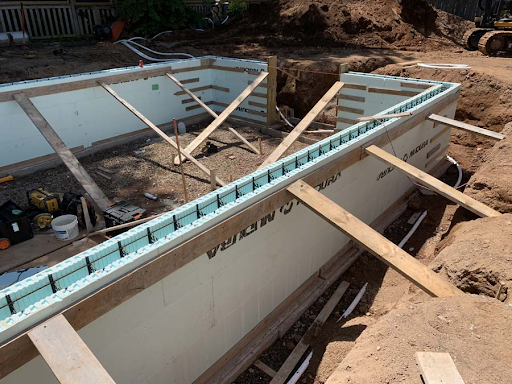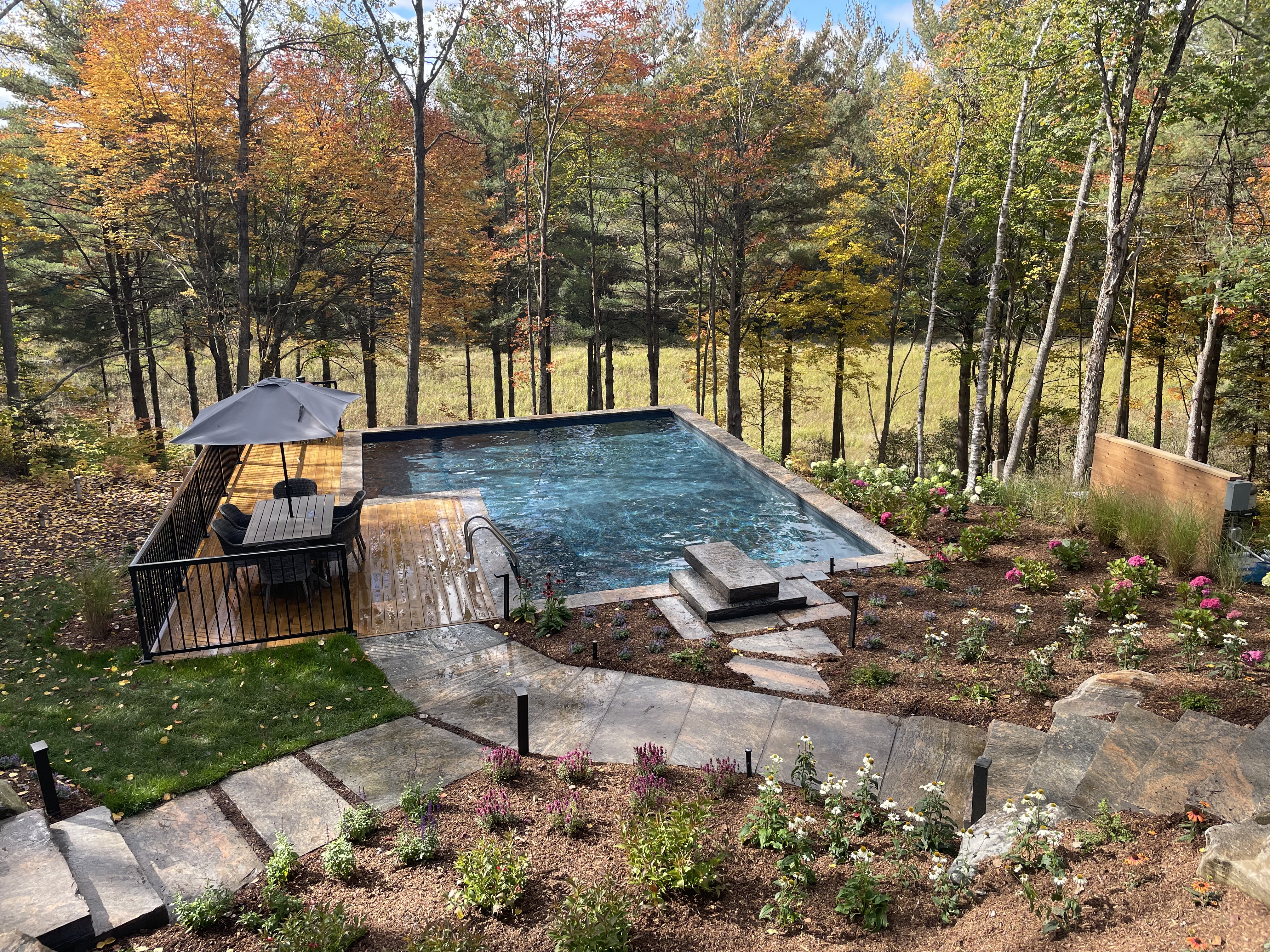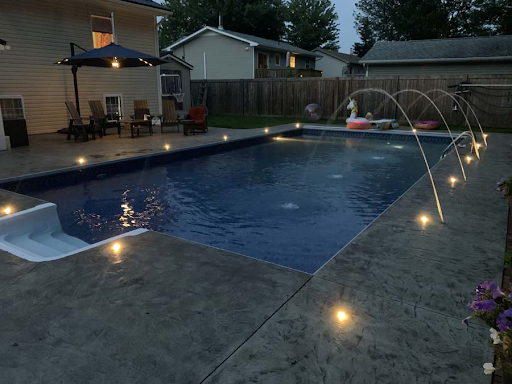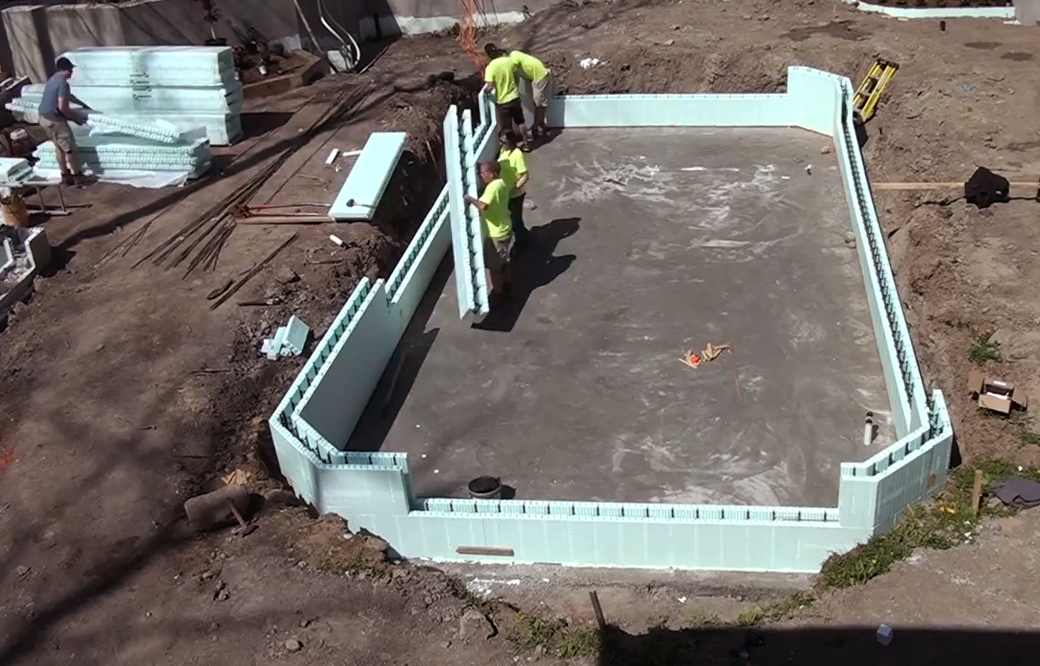
- Products
- Why Nudura
- Nudura Project Applications
- Training Academy
- Resources
- Company
Download the Pool Installation Booklet
Did you know that you can build a pool with insulated concrete forms? Like insulated concrete form (ICF) structural walls for homes and commercial buildings, ICFs improve in-ground swimming pools' energy efficiency and durability and speed of construction, benefiting consumers, builders and architects alike.
For example: 
- ICF swimming pools offer significant advantages to today's environmentally- conscious and busy consumers.
- Builders appreciate fast and easy ICF pool construction, which saves them time and money.
- Architects enjoy the design flexibility of ICFs, as they are suitable for above- and below-ground pools, community pools, as part of a custom home and more.
Five Benefits of Insulated Concrete Form Pools
For those who might be unfamiliar with ICF construction, the process is simple. Builders stack hollow-reinforced foam blocks to the desired height across the perimeter of the structure and then carefully fill them with concrete. The insulating power and overall strength of ICFs protect against thermal bridging or heat loss, regardless of the exterior temperatures — a concept that carries over well into swimming pool applications.
Read on to learn about the five main benefits of using insulated concrete forms for swimming pools.
1. Energy-Efficient ICF Pools

ICFs provide continuous insulation on the exterior, interior and bottom of the pool, helping stabilize the pool's temperature. For those who choose to heat or cool their pool, this can reduce energy costs by 60%. Traditionally-built pools can lose up to 80% of their heat through the sides and bottom because the ground conducts heat easier than the surface air.
In addition, stabilizing the pool's temperature can elongate the pool’s season, which is a significant benefit for homeowners in colder climates.
2. Durable and Long-Lasting ICF Pools
ICFs’ concrete core and foam exterior provide strength and integrity for longer-lasting pools with less maintenance.
Traditional concrete pools require extensive upkeep and costly water treatments to preserve the concrete's strength and to prevent cracks, pores and algae growth, which can lead to resurfacing the entire pool.
ICF pools solve this problem by surrounding the pool walls with EPS foam to create a quality waterproof barrier that shields the concrete from moisture infiltration.
3. Simple to Construct ICF Pools
Spray concrete crews for pools are in high demand, hard to schedule and are difficult to coordinate. Although many pools are built this way, ICF construction is a growing trend that should be adopted by pool companies if they want to become more efficient.
Building an ICF pool requires less labor, expertise and time than a traditional concrete pool:
- Unlike traditional concrete pool wall systems, ICF walls don't require exact excavations. If you over-dig an ICF pool excavation, all you need to do is backfill the walls once they are in place.
- Workers can easily handle lightweight ICF units, reducing time and labor costs.
- Building an ICF pool does not require heavy and costly delivery, lifting or cutting equipment.
4. The Design Versatility of ICF Pools
ICF forms come in many shapes and sizes that you can easily cut without heavy equipment. This feature allows designers to more easily and economically include elements such as curves, arches and radiused walls compared to other pool construction methods that only accommodate uniform designs.
5. Smooth and Consistent ICF Pool Wall Finishes
ICF pools offer more consistent wall finishes than standard concrete pools.
Contractors can create a smooth and 100% waterproof wall finish on the ICF pool wall by applying pool liners or plaster finishes over the pool plaster. This reduces the number of call-backs from homeowners who experience ripples in their pool liner or ineffective finishes that allow water to seep through.
It typically only takes one or two applications of the finish (about 1/2-inch thick) to complete the wall, and the resulting finish can last up to 10 years.

How to Build an ICF Swimming Pool?
When you are ready to begin your pool project, choose a designer and a reliable ICF manufacturer that is familiar with ICF pool construction. It is also beneficial to have professionals walk you through all the details surrounding feasible designs, timing and installation — all features that will vary from project to project.
Once you have correctly stacked and filled the ICF blocks with concrete, per proper installation instructions, the remaining steps are comparable to typical pool constructions. It's only a matter of time before you'll be ready to add water and jump in!
  |
About Cameron WareCameron Ware is a Senior Technical Sales Executive for Nudura for Texas, Oklahoma and Louisiana, providing installation training to architects, engineers, and ICF installation crews across the area. To date, Mr. Ware has been involved with the construction of several million square feet of ICF, including, over 100 ICF schools in Texas. Ware has supported and been involved on approximately 30 storm shelters incorporating ICF technology for the 250 mile per hour rated ICC-500 structures. |
CONTACT US
We’re committed to supporting homeowners and design professionals who are interested in or use our products. We’re always happy to help and provide more information.





